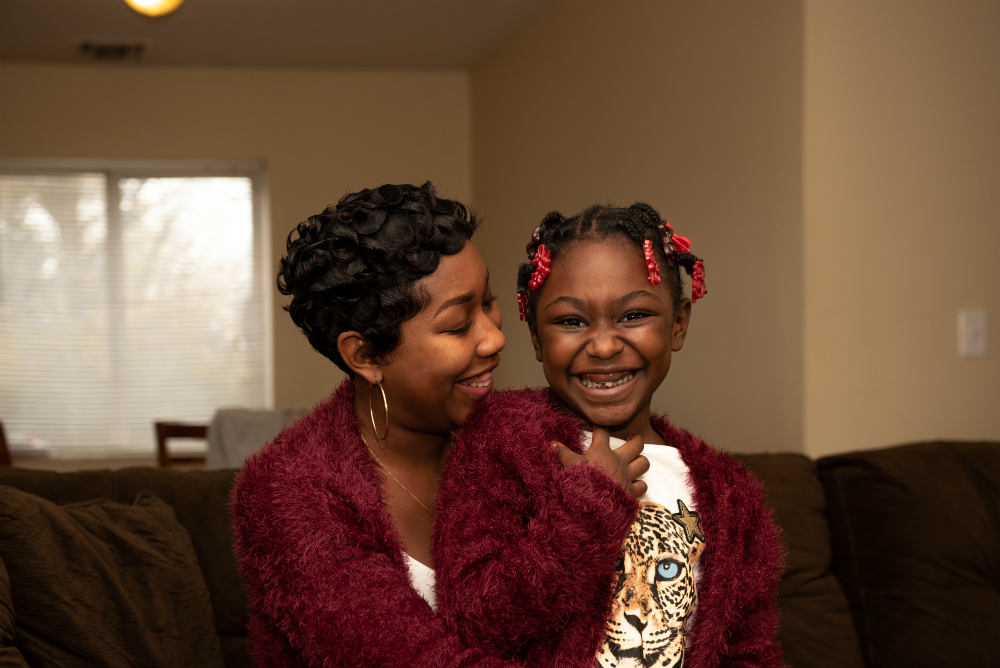Four years ago, Daisjona Whitson was at her lowest point.
Daisjona was already behind on rent when the father of her children was arrested and sentenced to serve jail time. Without his income, Daisjona struggled to pay the family bills. Soon, she and her young children were evicted from their home.
“There was a dumpster outside. The bailiff came. I was horrified,” Daisjona said.
Heartbroken and scared, she knew she had to do something. She dialed 2-1-1 and spoke to a community care advocate at United Way for Southeastern Michigan.
With just one phone call, Daisjona’s life began to turn around.
The 2-1-1 care advocate gave her phone numbers for various area shelters, and she called them every day while staying with a friend.
“She was so helpful,” Daisjona said. “If I hadn’t called 2-1-1, I wouldn’t know where to start. I would have just been out on the street with my kids.”
Daisjona’s story is, unfortunately, a familiar one in our region. Forty percent of Southeastern Michigan residents struggle to afford the basics like food, shelter, child care and transportation. For those who live paycheck to paycheck, a minor setback can lead to a major crisis.
United Way for Southeastern Michigan’s 2-1-1 is the safety net that connects thousands of people with resources they needed when a crisis emerges.
Our 2-1-1 helpline serves six Southeastern Michigan counties, and care advocates are there to help 24 hours a day, 365 days a year. Each year, nearly 200,000 people reach out to 2-1-1 via phone, email and text to connect to resources that meet their exact needs. The most common needs are utility, rent and food assistance.
Click here to support 2-1-1 this winter

Daisjona’s children, Adrian and Brielle.
Looking for a home
According to the State of Michigan, more than 66,000 Michiganders experienced homelessness in 2016. More than 13,800 were children.
Over the past year, 2-1-1 helped more than 36,600 people like Daisjona find housing resources such as assistance with rent and home repairs. Of those callers, 7,696 people sought emergency shelter.
“The people we help are not looking for a handout — they’re underinsured and underemployed. These are single moms and seniors who have income, but it’s not a livable wage,” said Hassan Hammoud, 2-1-1 community outreach and engagement director.
Even with information and resources, many families still struggle to find shelter. Limited funding means organizations can only help so much. Spots in emergency shelters can be hard to secure, and it takes time to apply for housing assistance.
While Daisjona stayed with a friend, it took her nearly a month’s worth of phone calls to find an open bed. And when she finally found a spot, she had to leave her kids, Brielle and Adrian, with her aunt for about a month until the shelter had room for them to join her.
Without United Way, Daisjona and her children may have been forced to spend a harsh winter on the street. Instead, they had a roof over their heads and time to get back on track.
“Going to the shelter was the best thing I could have ever done for my kids,” Daisjona said.
The family stayed at the shelter through February. But even with time to regroup at the shelter, they still struggled after they left without a permanent place to stay. They bounced between friends and family until August, when, through Section 8, Daisjona found a place to call home.
“Being able to obtain housing is one of the best feelings ever,” she said. “My kids are happy.”

Daisjona and Brielle share a laugh on the couch.
A better life
Having 2-1-1 as a resource was “truly a blessing,” Daisjona said. “Without 2-1-1, I wouldn’t know where to turn.”
Now, with a roof over her head, Daisjona can focus on making a better life for herself and her family.
“If I have stability, I can do so much more,” she said.
She’s in school, finishing prerequisite classes at Henry Ford Community College and working toward a career in communications. She wants to host a podcast. And she has a job, working as a 2-1-1 community care advocate for United Way, helping people who are in the same position she once found herself in.
“When calling 2-1-1, they have such a huge relief,” Daisjona said.
“I get people on the phone who are kind of going through what I went through. I give them a play-by-play, tell them what they can do and how they can do it.
“Every single day, someone has a story to tell.”
